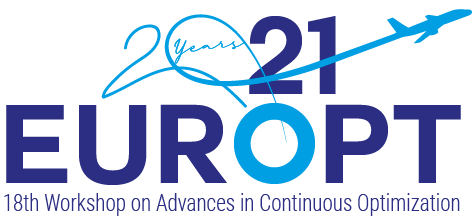TA-04: Optimization under Uncertainty and Applications I
Stream: Optimization under Uncertainty and Applications
Room: Lagrange
Chair(s): Eligius M.T. Hendrix
Kernel Distributionally Robust Optimization
Jia-Jie Zhu
We propose kernel distributionally robust optimization (Kernel DRO) using insights from functional analysis. Our method uses reproducing kernel Hilbert spaces to construct ambiguity sets, which can be generalized to integral probability metrics and moment bounds. This perspective unifies existing robust and stochastic optimization methods. We prove a theorem that generalizes the classical duality in the mathematical problem of moments. Using universal RKHSs, our method applies to a broad class of loss functions, lifting common limitations such as the knowledge of the Lipschitz constant.
Optimal residential Microgrid operation considering Vehicle-to-Home (V2H) and Vehicle-to-Grid (V2G) energy services
Mohamed Saâd El Harrab, Michel Nakhla
Energy Management System (EMS) plays a key role in operating Microgrids (MG). We consider a residential grid-connected MG equipped with PV system and PEV battery. Based on Stochastic Optimization and Machine Learning approaches, we investigate different scenarios of the MG optimization considering various uncertainties and constraints. The developed Home EMS (HEMS) optimizes the scheduling and the power dispatch of the MG considering V2G and V2H services and allows to identify household’s potential energy cost savings and the effectiveness of V2G and V2H strategies in operating the MG.
Convex Optimization using Tunable First-Order Inexact Oracles
Guillaume Van Dessel, François Glineur
Using black-box first-order methods with an approximate gradient, i.e. an inexact oracle, may significantly impact their convergence. In this work, we consider a tunable inexact oracle, which can provide first-order information with increasing levels of exactness, albeit with an increasing computational cost, which happens e.g. where the objective function is the optimal value of an inner subproblem. Given a target final accuracy, we show how to select the inexactness level at each step in order to minimize total computational budget, and present several situations where this is beneficial.
